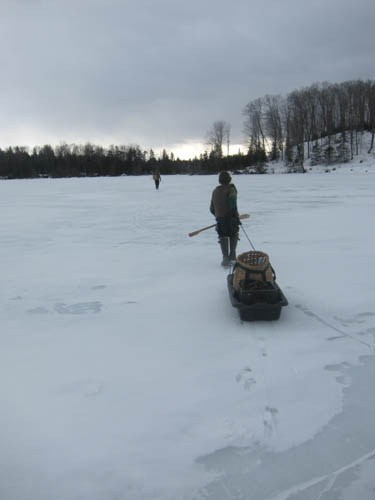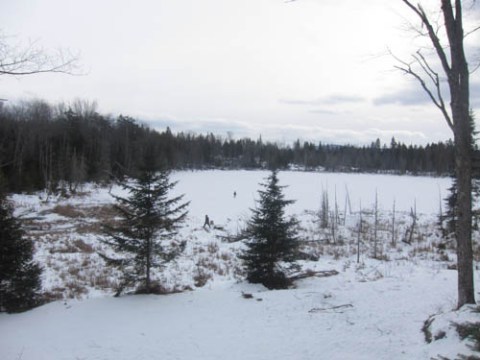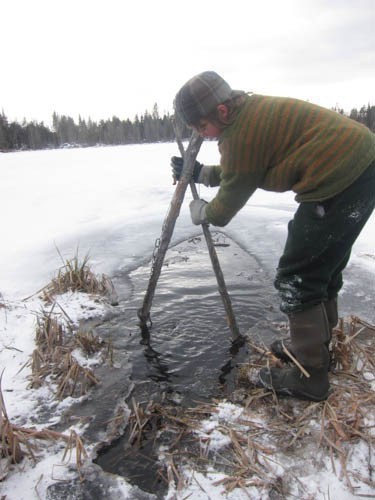Ben Hewitt's Blog, page 38
January 13, 2015
The Learning Never Stops
I know I do not do a great job of promoting my work (conversely, perhaps I do such a good job that I can say something like I know I do not do a great job of promoting my work and you actually believe me and feel a little sorry for me and therefore buy all my books AND hit the generosity enabler).
In all seriousness, I am not comfortable trumpeting my written work, and in particular, my books and articles. I generally mention them only to the extent they are present in my life, but rarely as entities unto themselves, if that makes any sense. I’m not sure why this is, but I think it might have something to do with my perception of my credibility. Or maybe my authenticity, to use one of the more over-used words of our time. I can’t say I fully understand the connection between self-promotion and credibility/authenticity, and it’s not as if I think authors who promote their work necessarily lack these qualities.
The flip side of all this is that selling my work is what makes all this possible. By “all this,” I mean our lives, or at least the version of our lives we’ve become so accustomed to. And I mean this blog, because despite the handful (ok, two handfuls) of readers who generously support my work in this space on a regular basis, my presence here cannot exist without the support of my books and articles, because if I did not have books and articles to sell, I’d like as not be employed in a manner that would not grant me the luxury of writing here.
Point being, I have a book coming out very soon. Basically, now. Actually, it’s Penny and I who have a book coming out. I’ve mentioned it in passing before. It’s called The Nourishing Homestead: One Back-to-the-Land Family’s (because I guess that’s what we are: A back-to-the-land family) Plan for Cultivating Soil, Skills, and Spirit. You can learn a bit more about it here. You can also order it there, or directly from me, or (my preference) from your local book seller. Huh. Seems as if I forgot to mention Amazon. Funny. But yeah, it’s there, too.
This book is about a lot of things – how we raise our animals, how we grow and process our annual and perennial crops, how we amend our soils, even how to determine the edibility of roadkill (no, really). It’s also about why we do these things, which to me is at least as important. Still, it’s primarily a how-to book; perhaps the best analogy I can make is to say it’s a lot like this blog, but with instructions. Maybe 30% philosophy and 70% practice. Oh, and there are lots and lots of photos. I think we submitted something like 250; I know a few got cut, but I’m guessing there are still more than 200 color images.
I worked harder on this manuscript than any previous (if any of my other editors are reading this, I’m lying). Part of that is because Penny played a huge role in its development, but equally, it’s simply more material than any of my previous books. It runs 120,000 words, which means it’s about 119,500 more words than than I’ve written thus far in this post. That’s a lot of words, and it doesn’t even include the tens of thousands of others that were discarded in the process.
Everything in The Nourishing Homestead – the mistakes, the triumphs, the lessons learned, and so on – is rooted in our experience, which collectively adds up to more than 40 years. Still, we could not have written this book ten or maybe even five years ago; we just weren’t ready. In some ways, it strikes me as a little presumptuous to believe we are ready now – there is still so much to learn. But then, there always will be. That is one of the greatest gifts of this life: The learning never stops.
I don’t think our book is the last word in homesteading resources. But I do think it’s pretty unique. Far as I know, it’s the only homesteading book to discuss soil remineralization in some depth. It goes pretty deep into whole foods nutrition. It explores site design and building techniques. A lot of animal husbandry. There’s even a recipe for beaver liver pate (don’t worry: You can substitute chicken, beef, or pork livers if you’re running short of beav).
Anyway. At the risk of somehow diminishing my credibility/authenticity (if not in your mind, then in mine), I’m actually kinda proud of this book. In short, I think it’s pretty good, and I hope you will buy it. Furthermore, if you buy it and you like it, I hope you will tell others about it. Conversely, if you think it sucks, I hope you will keep it to yourself. But honestly, I really don’t think you will. Well, unless you’re a vegan, in which case it’s a distinct possibility.
Oh, yeah, and one other thing, whilst I’m on a role: My amazing, generous friend Marie set up and oversees a Facebook page for me. I don’t entirely understand how FB works, and I don’t spend much time there, but here it is for your convenience. Oh, another thing: I’m writing a series of essays for Yankee magazine. For this year, they are about living on a northern Vermont homestead; next year, they will expand to include, well, whatever catches my eye. And ear: I will be producing a series of podcasts relating to the stories that catch my eye. I’m really looking forward to that.
As always, thank you for your support, both material and otherwise.

January 12, 2015
We Just Got Too Tired

An oldie. I always liked this picture.
We spent much of the weekend purging the basement, which, as is the wont of basements the world over, had become a repository for a diverse array of material goods. Stuff, I guess you’d call it. Many of these goods had outlived their usefulness to us, while some had merely never been particularly useful from the get-go: A folding table frame with two bent legs and no top; a pair of bush hog blades that do not fit our bush hog; a boom box with one speaker, a non-working CD player, and the disorienting tendency to switch between AM and FM according to its own unknowable whims; a pair of those rubbery beach sandals I haven’t worn since the last time we went on winter vacation, back in (I think) ’98. Hope springs eternal and all, but the only sand I’m likely to see for the foreseeable future are the occasional shovelfuls I liberate from the town garage to spread on our ice-covered driveway.
For the past year or so, we have felt a mounting sensation of heaviness relating to our accumulation of material goods. It pains me to admit this, mostly because I like to think of us as being thoughtful consumers, too evolved of spirit and intellect to fall for the commonplace notion that these items can make our lives better than they’d previously been.
Of course the tricky thing is that in some cases, it’s actually true. For instance, my life is better right now because I’m wearing pants (this makes your life better, too, because otherwise I might feel compelled to mention that I’m not wearing pants, and then you’d be stuck with that sorry image). And not just any pants, but a pair of thick Johnson Woolen pants Penny snagged at the thrift store for a ten-spot. I love these pants. I wear them almost every day from, oh, about December 1 to mid-March or so. I think they might be the best use of $10 thus far in my adult life, but that’s only because our wedding rings cost $15 each and thus do not qualify.
Actually, there’s a lot of stuff that makes my life better. But thoughtful as we’ve been, I bet that for every item we own that improves our lives, there’s at least one item we own that does not. The trick, of course, is distinguishing between the two, and what I’m finding as I age is that the former category is shrinking, as the latter grows. Mostly, it’s a lateral transition: Items that once made our lives better, or that we believed would someday make our lives better, have slowly drifted into the collection of those that have come to feel as if they are, in a manner that almost defies explanation, stifling us. Or maybe I don’t need to explain. Maybe you know exactly what I’m talking about.
Our needs seem to be shrinking. Wants, too. Mostly I do not question this, but every so often, I wonder why it is so. So far, the only explanation I’ve come up with is this: The human body is a vessel. It can carry only so much. And as we fill it with experiences and ideas and relationships, there becomes less room for everything else. Or at least, anything that does not contribute to these experiences, ideas, and relationships.
All the stuff that until yesterday was in basement – the sandals, the boom box, the bush hog blades, the metal table frame – wasn’t just in our basement. With every lumbering step we took, we carried some fraction of its weight, and I can honestly say that we didn’t get rid of them out of some high-falutin’ notion of further simplifying our lives.
Truth is, we just got too tired.

January 9, 2015
The Feeling That Lives in Pursuit
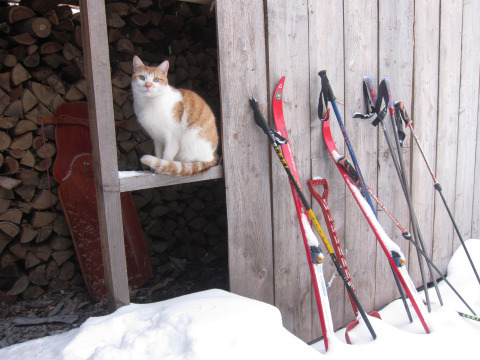
Winslow, admonishing me for not finishing the woodshed siding
We are all still in the clutches of this evil virus, stuporing through our days one foot-dragging step at a time. And before you chime in with your preferred folk remedy, know that we’ve tried ‘em all. We did the fermented beaver foreskin in a puree of raw garlic. We tried the reduction of sheep jowl in a soufflé of echinacea. We stripped naked and slathered ourselves in a tincture of hot rendered lard and desecrated wood nettles (that actually felt pretty good, though it sort of stung going on the tender parts). As of this morning, I’m back on my usual chest cold routine: A cup of cheap bourbon neat but for precisely two teaspoons of chamomile tea. Oh, and an extra cup of coffee. Funny, it’s the best I’ve felt all week.
A quick follow up to Wednesday’s post. You know, the one where I played it off like I actually have some particular insight into the craft of writing. Heh. As if. Still, if you believed me then, you might just believe me now; in that spirit, a couple of further thoughts come to mind.
First, I hope no one took that post as license to go and beat their poor, fool noggins against the same brick wall until – miracle of miracles – they eventually break through and the light of a thousand harp playing angels filters through the head-sized hole. Truth is, I think it’s pretty important to know when to quit. I struggle with that sometimes; I’m forever trying to recognize the small deviations of thought and emotion separating those moments when I ought just keep pushing, and those moments when I’d be better served by retreat. What are those deviations? That, my friends, is the secret hiding behind the consulting link in the left-most margin of this page. Hah. No, not really. Truth is, it doesn’t work like that. Truth is, you’ve gotta figure out your own deviations for yourself.
Still, my larger point remains: Only occasionally will it flow the way you probably want it to flow. Even if you’re the bastard child of Faulkner, Twain, Abbey, and (trying to think of a woman so I don’t come off as sexist… ah, I got one!) Mary Oliver, as clearly born to write as if you’d sprung from the womb with a stack of sharpened #2 Ticonderoga pencils in your pink, wrinkled paw, you’re gonna struggle. And therefore, those moments when you don’t struggle, when you can’t write fast enough to keep up with the genius flowing off your frontal cortex (or wherever genius flows off of), will stand in sharper relief. They’ll be all the sweeter.
One other thing before I refill my cup of, um, tea. Another of my students recently asked me if, in so many words, she has what it takes. If (and again, I’m paraphrasing) the quality of her work suggested to me that it was really worth pursuing her writing. For anyone wondering the same, here’s what I think about that: If you’re getting something out of the process, it’s worth it. If, through all struggle and hopefully the occasional trickle of genius, you feel as if it’s illuminating something for you, it’s worth pursuing. If it’s plain and simple fun, it’s worth pursuing. If you get some strange pleasure out of it, something that might even defy your ability to articulate it, it’s worth pursuing.
I often think about it in relation to my guitar playing, which I’ve been doing a lot of lately. I’m not very good, and I strongly suspect that five years from now, I’ll still be not very good. But every so often, something I play sounds halfway decent. Every so often, I feel like I think it might feel to be someone who really, truly knows how to play the damn thing (for the link-leery: Don’t fret, that’s some classy shit, right there). It doesn’t matter that what I play sounds nothing like that. As is so often the case in life, what matters isn’t the result itself, but rather the feeling that lives in pursuit of the result. Make sense?
Oh, wait, one more thing, and it’s probably the most valuable thing I’ve had to say about writing yet and yet it’s so friggin’ simple. You really want to improve your writing? Read it aloud to yourself. You’ll be amazed at what you hear, all the glitches and hiccups of words and syntax and pacing you’d never have noticed otherwise.

January 8, 2015
The Wall That Isn’t There
Last night in Melvin’s barn frost almost covered the interior walls and when I went to fill the wheelbarrow with sawdust, I had to chip it away from the pile in frozen-together chunks. Melvin told me how when he was a boy and it got real cold, he’d go at the sawdust pile with an ax, chop it almost like firewood.
I rolled the bale down the aisle, listened as the chorus of chewing built in my wake. You ever stood in the middle of 40 chewing cows? My advise is if you get the chance, don’t turn it down. Besides the chewing, there was the metronomic backdrop of the gutter cleaner, clacking as it carried the day’s worth of shit and piss up and out of the barn. Melvin straddled the cleaner at a strategic point near the exit, using a shovel to guide the slurry so it didn’t overflow the sides.
When I came out of the barn, it was 7 below zero and the wind was picking up. I went home. Had soup. Stoked the fire. Bed.
This morning, it was 23 below zero when I set out to milk. I’d been up in the night listening to the wind and thinking of the animals. I can’t help it when it’s this cold. The night before I’d given the pigs a fresh bale of bedding and an extra ration of milk, the cows and sheep a serving of precious second-cut from the small stash reserved for such occasions. Web duck got a particularly fat handful of grain, and everyone was fine. They’re always fine.
We milk by hand, in an open-sided pole barn, and I thought I was going to be cold, but I wasn’t. Chores had warmed me, brought blood to fingers and toes. The sun was coming over the eastern horizon. It looked like it was rising straight out of Melvin’s hayfield. Web duck had her head tucked deep into her back feathers. She was next to me. Waiting for her milk. Waiting for the sun to slide a little higher, slant its way through the wall that isn’t there.

January 7, 2015
It Can Be No Other Way
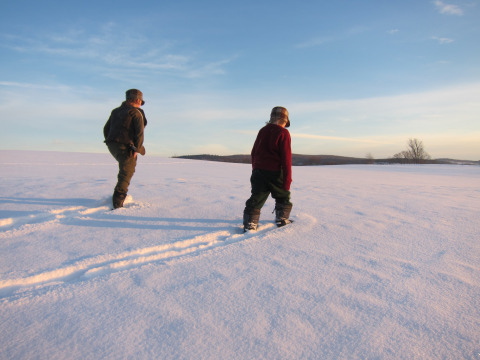
Walking
Not many people reading this blog know it, but a while back (like, two decades ago, which was probably when some of you still needed a reminder to pull down your pants before you peed and damn but if that ain’t humbling to an ole fart like myself) I was a pretty good competitive cyclist. I raced mountain bikes mostly, in the preferred format of the day, which generally involved two hour, mass start events. At the time, cross country mountain bike racing was hugely popular; it was on the verge of becoming an Olympic sport, and the number of people willing to drive multiple hours so they could saddle their bicycles and pay to ride in circles until they vomited was really something to behold.
I raced at the highest regional level, and while I didn’t win very many events, I was consistently toward the front. I stood on the podium fairly regularly, though most commonly on its bottom step. I think the biggest thing separating me from the absolute best guys was pretty simple: I didn’t care enough. It never really bothered me that I didn’t win very often. In fact, I was always sort of amazed that I did as well as I did, and I couldn’t fathom doing many of the things the guys who were beating me did. Fly to Arizona to train in February, for instance. Or shaving their legs. Eating rice cakes. Living in their parents’ basement. That sort of stuff.
Anyway, what I really loved about riding my bike competitively was that every so often, I’d have a transcendental performance. I mean, I’d seriously be crying on the bike, and not from pain or grief, but from the pure gratitude of being allowed a glimpse of what being human can feel like. Everything would click so perfectly that I almost couldn’t feel the effort being expended, it was as if the bike were racing itself and I was merely fortunate enough to be along for the ride. This didn’t happen often – maybe one out of every seven or eight races – but it happened often enough that I never forgot the feeling. I never thought I wouldn’t experience it again. I just had to keep looking for it.
What happened the other 85% of the time? Usually, it was sort of average. Not miserable, but certainly not transcendental. Just a skinny, lycra-clad dude huffing and puffing and sweating. And on occasion, it was truly miserable. Legs like lead balloons. Lungs burning. Mind fixated on counting down the interminable minutes until the finish line. Questioning everything: the hours wasted training, the self-loathing of knowing Penny was at home, mixing cement for the concrete piers of our original cabin, while I was doing… what, exactly? Riding my bike in circles like a circus monkey and furthermore, spending money we barely had for the privilege? I’d bring her flowers if I placed high enough, lay them right in her blistered hands.
I mention this because I received an email from one of my writing students; she’s struggling with her work. I mean I know how I want to write, I just can’t seem to get this new way to come out on paper, if that makes any sense, she tells me. Oh, yeah, A, it makes sense. It makes a whole freakin’ lot of sense. It especially makes sense to me lately, ’cause truth is, I’ve been struggling, too. Like this woman, I’ve had the sense over the past couple of weeks that I know how I want to write, but I can’t quite get it to come out on paper. My suspicion is that most writers – even so-called “professional” writers – feel that way an awful lot of the time. They probably don’t want you to know that. We pros like to think there’s something sacred about our craft, that we’re the beneficiaries of a particular genius you poor commoners will never understand. Bullocks.
Here’s what I think about writing. No, scratch that: Here’s what I think about life. And bike racing, for that matter, which was the whole point of my long-winded introduction. You gotta muddle your way through a lot of shit to get to the sweet spots. Actually, it’s even more than that: You can’t even find the sweet spots if you don’t muddle through the crap. If you don’t hurt a little, if you don’t drag your sorry sick ass outside to do chores on a four below morning, you’ll never fully appreciate those August mornings when you rise at 5 full of piss and vinegar and you’re on the land by 5:30, and the cows are right where they’re supposed to be, waiting for you to drop the fence and the grass is boot-top high and so green you think there should be another word for it. If you don’t stick out the long months of winter, the truck that won’t start despite three – three! – cycles of the glow plugs, the 4:30 darkness, that craving you have for just a glimpse of sun please, please, please but even the long term forecast is all clouds and cold, you’ll never fully appreciate that day in early March when it hits 47 and the sap is running something fierce and you’re down to a tee shirt and sunburned by noon.
To my student, and to anyone who struggles with their writing (and therefore, to myself), I say this: If you don’t write the sentences that, no matter how many times you rewrite and reorder and rework them, never seem to say what you want them to say, if you don’t do that over and over and over again…. well. You’ll never find the ones that write themselves, the ones that fall into place as if they already existed (and truth is, they probably did). You’ll never know how effortless it can be – not always, not often, certainly not as frequently as you’d like. But often enough to keep calling you forward. Often enough that you do what I’ve been doing for the past couple of weeks, lurching along, doing what needs to be done. It can be a little painful. If you’re offering your work for public appraisal, as I am, it can be a little embarrassing.
It can also be no other way.

January 6, 2015
Sort of Important
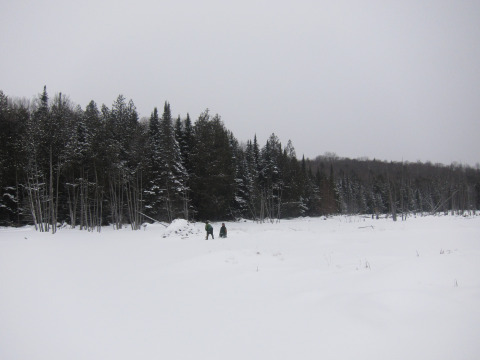
On ice
Heh. I just noticed that yesterdays post is titled Most Importantly and today’s is called Sort of Important. Stay tuned for tomorrow’s post: Possibly Just a Little Important
Both boys are sick, so last night I filled in for them at Melvin’s barn. It had been a while; most of last winter, I went down a night or two each week to help feed out and scrape shit into the gutter. But this fall I lost the gig to my sons, and it occurs to me that it’s only the first in a long line of duties that will be passed to my boys over the years.
I like going into the barn at night, particularly when it’s as cold as it was yesterday. It was zero and blowing something fierce by the time I pulled into the barnyard. Moonlight reflected hard off the iced-over pasture. In the barn, warm clouds of respiration hung above the cows’ heads. There’s something vaguely prehistoric about those big Holstein heads, the way they lumber and lurch at the end of those long, yearning necks. I starting rolling out the bale. A nice bale. Dry and light. Second cut, too. The hay felt good in my hands, so I left the hay hook hanging from its rusty nail.
The light was dim and the air thick with the sweet smells of fresh manure and fermented hay, and Melvin was wearing the insulated ear flap cap he wears when the thermometer’s headed for south of nothing. He was fiddling with the gutter cleaner when I got there. He is forever fiddling with the gutter cleaner, it seems. He’s gotten something like ten more years out of the cleaner chain than he was supposed to, and he seems intent on nursing it through another ten years, perhaps because the chances of it being someone else’s problem by then are at least 50-50, and he knows it. No one accepts their own mortality like farmers. Well, maybe morticians.
Or maybe it’s simpler than that. I remember how last winter, he showed me a link that had recently broken, how the roller pin had worn almost all the way through the link plate. He was grinning like he does when he’s pleased with himself, and it was clear to me that the pleasure he gleaned in having coaxed so much life out of that thin piece of steel was a greater thing than the inconvenience of its breaking.
I hope I don’t forget that. It seems sort of important.

January 5, 2015
Most Importantly

Ice rimed
I wrestled the snowplow onto the truck this morning; the wind was gusting fierce from the south, and I watched an empty five-gallon bucket skitter across the yard like a north country homestead tumbleweed. Five gallon buckets are unheralded champions of the rural life, the best damn use of plastic since the 45 rpm. Better yet, they lend a distinctly white trash charm to even the most bucolic homestead landscape, especially when they’re blown willy nilly across the yard by the encroaching cold front. I don’t know about you, but the older I get, the less patience I have with bucolic. I want to see some grit and gumption. I want to see some trash and tarnish. I want to see the exposed, flayed-open underbelly of it all. It’s so much more interesting, don’t you think?
That fuckin’ plow. It’s about 20 years old, one of the early versions of what Fisher calls “Minute Mount” and boy but wouldn’t I have loved to be a fly on the wall for the meeting from which that particular moniker emerged:
Marketing Chump: “Let’s see boys, what should we call this puppy?”
Engineering Dude: “Well, other than the fact that it takes about 20 solid minutes of knuckle bashing, back-and-forthing, creative cursing, and tool hurling to mount the damn thing, we’ve got ourselves a real good product.”
MC: “Ok, then. We’ll call it Minute Mount.”
And the room dissolves into evil cackling.
Still and all. Beats the shit out of a shovel, I know that much.
• • •
We’re into January proper, which is about the time I start eyeing the firewood and hay reserves with a calculating eye. You’d think after all these years I’d have it down cold, but there are always contingencies. For instance, this year we’re burning mostly what I like to call “grade B” firewood: I cut a patch of white birch pretty heavy last winter, as most of it was slowly rotting on the stem.
I like white birch. It’s good for an awful lot of things. The bark is amazing stuff, and the wood is nice for carving into things like bowls and Cree snow shovels and whatnot. But it’s only halfway decent firewood. That’s because it’s a bit shy in the BTU department and also because it holds a lot of moisture, thus necessitating a relatively longer drying period, which we never seem to manage. And even then, it’s prone to sputtering a bit. On the plus side, the papery, combustible nature of its bark is a thing of beauty. It’s like having built-in firestarter.
Anyway. As I get older, I’m becoming less of a firewood snob (actually, the older I get, the lower my overall standard of living seems to be sinking, which is perhaps a topic for another day). Twas a day I was strictly a hard maple and white ash sort of fellow, but nowadays I throw all sorts of lesser species into the mix. Hell, there’s even a few sticks of poplar in the woodshed this year, which is a new low for us, because if white birch is grade B, poplar failed out years ago and mostly spends his days hanging out on the street corner, selling dime bags of dirt weed.
We’re actually about halfway through our wood reserves, which means we’re well short of abiding by the old chestnut “half your wood and half your hay by Groundhog Day.” But that’s ok. We’re coming close to the return of Sol (please, please let this be true, ’cause it’s been some dreary the past couple months, let me tell you), and the south-facing nature of our house creates an interesting dynamic: We actually burn more firewood in November and December than we do in January and February. A lot more. It surprises me every year, which it shouldn’t, but that’s ok, because I like surprises, especially when the surprise is that we won’t have to spend the month of March scavenging firewood.
So: Today’s lessons.
1) Plastic buckets rock
2) Bucolic is boring
3) Minute Mount plows don’t. Mount in a minute, that is.
4) They still beat a shovel
5) Face your house South. Unless you live below the equator.
And finally, most importantly 6) Let yourself be surprised

January 4, 2015
Overthrowing the System, One Log at a Time
The confluence of holiday socializing, firewood-gittin’, and a New Year’s virus finally caught up with me this morning, and I came to my desk thinking it Monday and therefore as good a day as any to tuck into the sundry projects begging attention. By the time I realized the start of the work week is still a full 24 hours hence, the snow that fell overnight had turned to rain, and this bleak fact, coupled with the congealed porridge of mucous rattling my every labored breath (hope you weren’t planning on oatmeal for breakfast!), cemented my decision to just stay put.
We launched the New Year with vigor, and this was particularly impressive, considering we stayed up ’til all hours – 10:30! – at a friends’ party. I felled and skidded what I’m currently estimating to be approximately six cords worth of hardwood logs, a calculation arrived at despite my long history of firewood-related optimism and the unflattering truth that year after year after year my initial estimates prove themselves ridiculously inflated. So, yeah, in truth, there’s probably about four cords of firewood at the landing. But that’s still four cords more than were there a few days ago.
While I sawed and skidded, the boys and Penny split and piled, and all in all it was a fine way to ring in the first two days of the New Year. For all the food we grow, and for the multitude of other ways in which we fill the cup of our needs from our own wellspring, putting up the fuel for a winter’s worth of fires – some for warming, some for cooking, all for pleasure – is the act that brings me the greatest sense of satisfaction and, in a way I fear I will struggle to explain, liberation.
As Andrea recently reminded me, it was Edward Abbey who wrote the cliffs notes guide to overthrowing the system: Brew your own beer; kick in your Tee Vee; kill your own beef; build your own cabin and piss off the front porch whenever you bloody well feel like it. Good stuff, Ed, and not a bit of it in the wrong, but for those of us in the north country, I hasten to add one more: Put up your own damn firewood.
• • •
The last post brought a few trapping related questions.
First, thanks to everyone who’s recommend it, but we’ve seen Happy People. In an actual theater, even! Got in line at noon for the 7:00 p.m. show. That was a long, lonely wait, let me tell you.
Second, there is very little chance of catching non-target animals in underwater sets, which is one of the reasons the boys are particularly keen on water trapping. Most crucially, there is essentially no chance of bagging someone’s pet.
Third, the boys trap primarily for meat and fur and are committed to utilizing the whole animal (beaver liver pate, anyone? No? How ’bout muskrat pot pie?). They do sell a small number of furs to local craftspeople, but they are not drawn to commodity fur selling.
Fourth, the conibear traps like the one pictured kill instantly.
Fifth (and even though no one asked about it), supporting the boys’ trapping exploits was initially difficult for Penny and me. It was only through significant amounts of research and examination of preconceived notions that we have, over time, become accepting and even appreciative of their passion.

January 2, 2015
Everything You Ever Wanted to Know About Trapping Beaver But Were Afraid To Ask: A New Year’s Pictorial
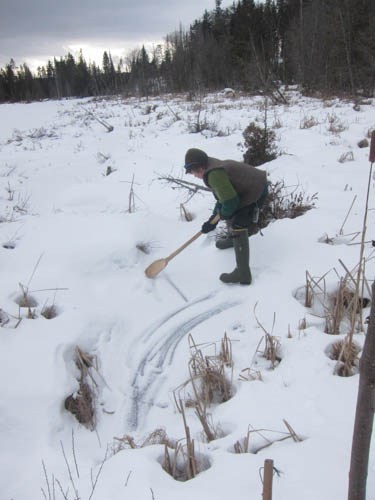 Checking the ice for bubble trails with a homemade Cree snow shovel. Shovel is also used to thump ice to test thickness and for occasional brotherly sparring
Checking the ice for bubble trails with a homemade Cree snow shovel. Shovel is also used to thump ice to test thickness and for occasional brotherly sparring
 Difference in ice where muskrats have traveled (very thin ice shelf compared to 8″ – 10″ elsewhere)
Difference in ice where muskrats have traveled (very thin ice shelf compared to 8″ – 10″ elsewhere)
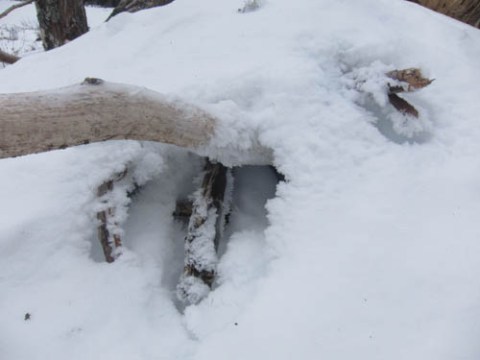 Ice crystals formed around breathing hole in lodge
Ice crystals formed around breathing hole in lodge
 Using setting tongs to compress trap springs
Using setting tongs to compress trap springs
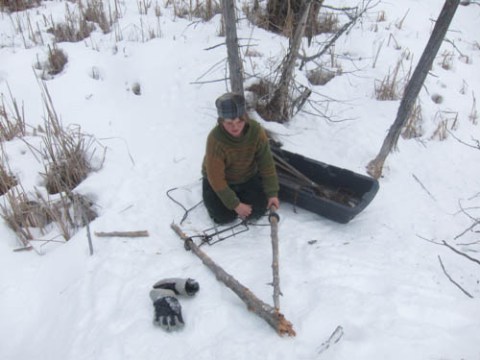 Putting trap on a carriage to hold it in place
Putting trap on a carriage to hold it in place
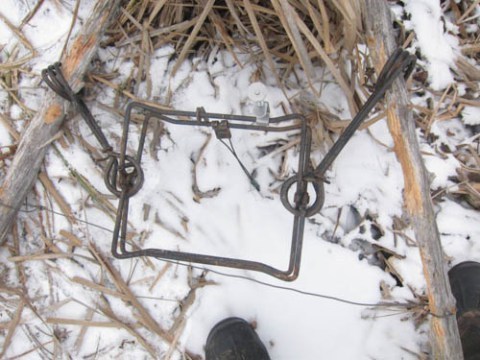 Conibear killer trap on carriage. Conibears are basically giant rat traps.
Conibear killer trap on carriage. Conibears are basically giant rat traps.

December 31, 2014
Last But Not Least
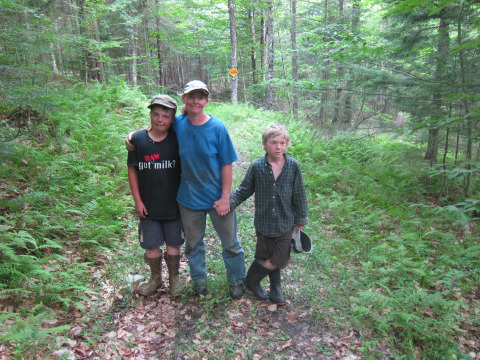
My best friends. Mushroom ramble, circa summer ’14
A handful of readers have recently asked to hear more from Penny, and that’s real sweet. Truth is, though, it’s probably not gonna happen; as I’ve mentioned previously, Penny is not drawn to the computer for anything but what she considers essential tasks. And I do mean “essential:” Back when we were working on the forthcoming tome (and it just now occurs to me that if you really want to hear from her, you should just buy the book, ’cause it’s in large part hers), she actually wrote her contributions by hand, generally on scraps of paper liberated from the recycling bin in the pantry.
As you might imagine, this was enormously frustrating for me, since it meant that I had to transcribe literally tens of thousands of her words over the year or so we spent writing the book. If there’s a price to pay for love, I suppose this was mine, though we’re fairly young yet: Who knows what she’ll spring on me next?
Still and all, I loved working on that book with her, I really did. And I think it’s a testament to our relationship that we were able to pull it off with only the occasional passing irritation (and the black eye I sported for awhile? I, um, walked into a door… yeah, that’s it). We’ve always been good at working together; maybe not perfect, but good. We have a very different approach at the outset of projects – putting it mildly, Penny’s more detail oriented than I am – but once we’re into the nitty gritty, we’re both bull n’ jammers. Believe you me, we’re flawed a dozen ways to Sunday, but one aspect of our collective character I take some small pride in is our ability to git ‘r dun. Somewhere we have a picture of Penny hanging drywall when she was 9 months preggers with Fin. I’d post it, but one black eye per year is already one more than enough.
For a variety of reasons that will be revealed over the coming weeks and months, we’re going to be relying on our git ‘r dun ability pretty heavily over the coming year. I don’t mean to sound too opaque; it’s just that it’s sometimes a little tricky balancing the private and public spheres of our life. Honestly, I never imagined this blog would attract even half the reach it has, and while I try very hard to not self-censor based on the breadth of my readership, I can’t say I’m entirely unaffected by it.
Anyway. For those who have expressed interest in hearing more from Penny, I have two thoughts. First, by the book. And not just because I want/need you to buy it (though would that not be reason enough? I think it would), but because of the 120,000 or so words, I bet a third or more are hers, not to mention the 200 or so pictures she contributed, only some of which have appeared on this blog. Second, realize that even though I’m the one writing in this space, my life and ideas (and by extension, the bits and pieces of my life and ideas I share here) have been irrevocably shaped by my wife. Only those of you who know us personally can fully appreciate how fortunate I am to have this be so.
And finally, last but not least:
Miss Mama
Miss Mama is 32 years old. She is short and stout and far prettier than she believes herself to be. She lives outside Peoria, Illinois with her 7 year-old son, Horace. By day, Miss Mama works as a librarian in a local elementary school. Two nights per week, she pole dances at The Jug Factory, a so-called “gentleman’s club” (for my mid-western readers, she works Thursdays and Saturdays, and usually goes on around 9:25. Just sayin’). Miss Mama takes pride in her dancing, which she took up in the aftermath of her husband Franklin’s untimely death and the concurrent loss of his income (there was no life insurance policy).
Franklin was a storm chaser who disappeared in 2012 when the tornado he was filming veered off course. Miss Mama grieves his passing most acutely in the winter nights after she returns from her shift at the Jug Factory. She lies in bed until dawn, listening to Franklin’s voice in the wind as it slaps against the thin walls of her single-story home. He tells her that he is ok. He tells her to to try and remain grateful for the years they had together. But it is not easy.
Miss Mama’s favorite band is Blackberry Smoke. She particularly likes this song. She does not know it yet, but sometime in the second quarter of 2015, the owner of the Jug Factory, whose earnest charm and general kindness toward all creatures great and small bely the stereotype suggested by his career path, will ask for her hand in marriage. Franklin’s voice in the wind will give his blessing and she will accept.
And in the third quarter, Miss Mama will win the Illinois state lotto.

Ben Hewitt's Blog
- Ben Hewitt's profile
- 37 followers





